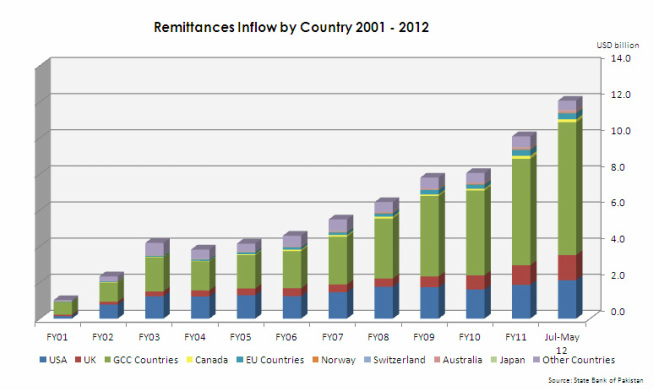Much is being said and written about the issue of dual-nationality on an everyday basis recently. What puzzles me is the often repeated argument in support of the “right” of dual nationals to hold public office or to vote – the contributions of the overseas Pakistani community and their stakes in Pakistan. What exactly are these contributions, you ask? In response, you would generally be directed towards the stellar growth in remittances over the past few years.
Steadily rising each month, these remittances have been unfettered by the economic mayhem in the countries they are flowing from of the recent past and continuing. From USD 5.96 billion in FY08, they have grown to above USD 12 billion in the Jul 2011–May 2012 period as per official figures. Impassioned members of the Pakistani diaspora would like you to believe that this upward trend reflects the immense love on the part of overseas Pakistanis for their poor dear homeland. Government officials like to do the same; after all, they are desperate to claim credit for anything seemingly positive, regardless of whether their policies and actions had anything to do with it. Another implication of this defense would be that remittances have played a critical role in keeping the Pakistani economy afloat. This, however, is exactly where the argument flounders. Before I delve into its weaknesses, a closer look at the data reveals important points that proponents of this argument fail, or perhaps choose not, to consider.
Since the main contention is whether the contributions of dual nations to Pakistan’s economy is really that significant enough to earn them a voice in Pakistan’s affairs, the remittances data needs to be examined from this perspective. The largest inflow in the July 2011-May 2012 period has been from Saudi Arabia (USD 3.35 billion). More interestingly, 61% of the remittances (USD 7.35 billion) are from GCC countries. These countries do not allow citizenships to be granted on the basis of extended residence and consequently, most Pakistani workers there do not hold dual citizenship.
This leaves behind 39% of the total remittances inflow. Another 10% of remittances come from European countries other than UK, Canada, Australia, Japan and other countries. Given their relatively little individual representation in the remittances inflow, the only remaining major contributions are from the UK and US constituting around 29% of the total remittances. These countries have been the destination of choice for Pakistani immigrants in recent years and many have succeeded in obtaining the coveted citizenship of these two nations. However, even with their collective magnitude of USD 3.5 billion, dual nationality proponents cannot usurp the whole of these inflows to represent their contributions. Without data on the exact sources of these inflows, it cannot be said with any degree of certainty whether the main contributors are naturalized Pakistanis in these countries or temporary workers. The figures do, however, highlight that the contribution of dual-national Pakistanis to total remittances may very well be minor in the overall picture.
Another point of note is that the continually rising remittances are not simply an outcome of patriotism; they have been necessitated by the ridiculous inflation in Pakistan over the past few years. Recipient families and senders will unfortunately testify to this.
Does a visit every few years to Pakistan, only to realize how much worse things have become out there and be grateful for their fall-back option in the form of a foreign nationality, translate into actual stakes in the well-being of Pakistan? The truth is that the greater time a person spends in another country, the weaker his or her ties to Pakistan get. Although initially migrants may be supporting dependants back home, this support in the form of remittances dwindles over time. In many cases, dependants follow a person settled abroad. For most migrants, this contribution in the form of remittances is time-bound.
Interestingly, this might be one of the factors at play when we examine the share of remittances coming from UK relative to the number of Pakistani migrants there. At around 1.2 million, the Pakistani migrant community in the UK is second only to Saudi Arabia. A significant portion of the Pakistani diaspora has been settled in the UK for several years and for multiple generations in several cases, but their per capita contribution to remittances is significantly below the GCC countries, USA, Canada and Australia.
Becoming a foreign citizen is a serious business. For those with new sworn loyalties, clamouring for their supposed rights as dual-citizens of an impoverished nation seems a tad unreasonable. The right to have a say in the governance of Pakistan belongs to the people battling with the multitude of issues plaguing the country on an everyday basis. This right should not belong to those who make their economic contributions and allegiances elsewhere.
The question is, do these remittances which do little for the economy as opposed to the individual family, translate into significant contributions of dual nationals to Pakistan? If this is the major argument they use to rationalize their right to have a voice in the country’s affairs, then it is a rather weak one.
Note: Interestingly, the day after I write this, Umar Cheema writes the same thing about remittances in The News here .
